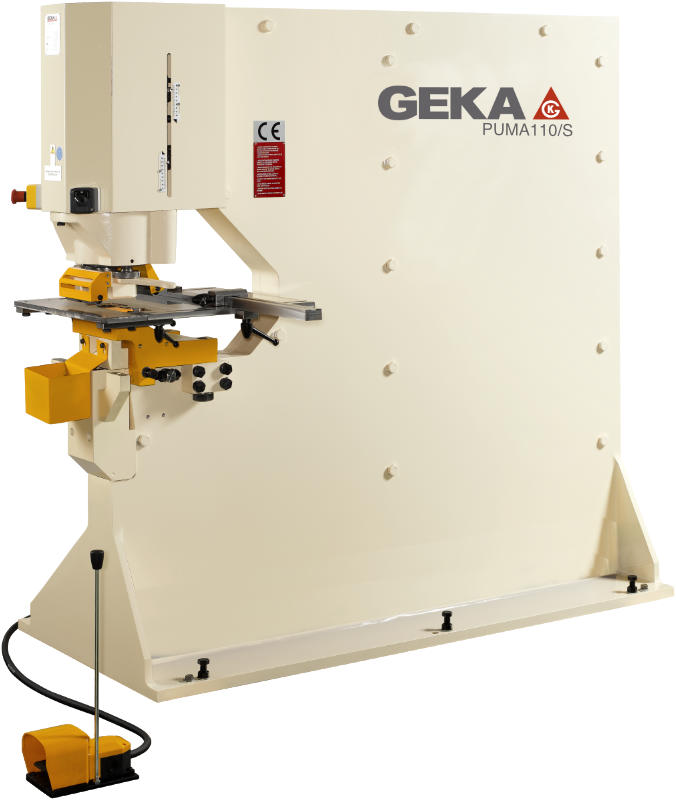Puma 110 Punching Machine
The Geka Puma 110 is one of the models available in Geka’s Puma Series of punching machines for the ironworking industry.
These machines feature a punching power of 1100 KN (110 tons) and have a maximum capacity for diameters of 40 mm x 20 mm. Like the rest of punching machines in the Puma Series, the Puma 110 is available in two versions. The S version of the Puma 110 has a throat depth of 500 mm while the SD version features a throat depth of 750 mm.
Features of the Puma 110 Punching Machine
- Guided cylinder
- Technically dimensioned frame
- Strong shaft system to avoid distortions
- Guided punch centering
- Safety protection
- Quick punch change material stripper for Geka tools
- Optimum operation speed

Puma 110 Punching Machine Specifications
| Specifications | Version (S o SD) | PUMA 110 |
|---|---|---|
| PUNCHING | ||
| Punching power | 1100 KN | |
| Maximum capacity | Ø 40 mm x 20 mm | |
| Throat Depths | S | 500 mm |
| SD | 750 mm | |
| PUNCHING OF SECTIONS WITH GOOSENECK DIE HOLDER | ||
| I on the leg | 100-450 mm | |
| I on the web | 100-500 mm | |
| U on the leg | 120-400 mm | |
| U on the web | 120-400 mm | |
| GENERAL FEATURES | ||
| Motor power | 9 kW | |
| Strokes per minute based on ¾” travel of punching cylinder | 28 | |
| Maximum stroke | 80 mm | |
| Working height | S | 991 mm |
| SD | 1066 mm | |
| Net weight | S | 3150 kg |
| SD | 3970 kg | |
| Gross weight | S | 3400 kg |
| SD | 4300 kg | |
| Volume | S | 5.55 m3 |
| SD | 6.82 m3 | |
| Dimensions with Seaworthy Packaging | S | 2.08 m x 1.32 m x 2.05 m |
| SD | 2.28 m x 1.3 m x 2.3 m | |
| OPTIONAL EQUIPMENT | ||
| Pipe notching | 60 mm | |
| Oversize diameters punching | Ø 100 mm x 8 mm | |
- Capacities based on a material resistance of 45 Kg/mm2.
- GEKA may change technical specifications, equipment and photographs of models, as well as any other information contained herein.
- Technical characteristics valid except for typographical errors or omissions.
Puma 110 Optional Accessories
- Oversize punching attachment
- Punch gauging table
- Semi-paxy X-Y positioning table system
